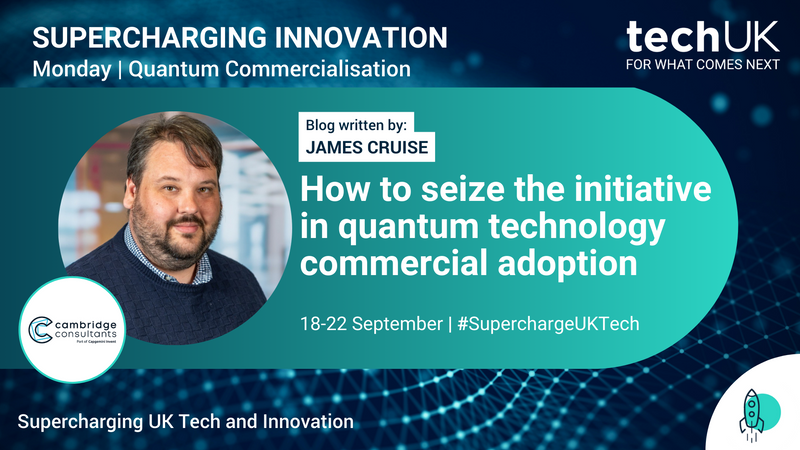How to seize the initiative in quantum technology commercial adoption

There’s no doubt that the quantum technology revolution is going to change the world. The only outstanding questions that businesses now face is exactly how it is going to affect them, and what steps they should be taking to successfully ride the wave of disruption. My key message? Whatever you do, don’t wait around to see which way the wind is blowing – start road-mapping your commercial adoption now.
There’s certainly plenty of noise around quantum so prevarication is perhaps understandable. Business leaders are rightly seeking clarity from trustworthy partners who can help them cut through the hype and traverse the emerging opportunities. Especially as quantum technology won’t transform everything. There are lots of applications for which it will be of no use.
It’s for these reasons that I think techUK’s November summit, ‘Supercharging innovation into action’, is so timely. Along with AI, Web3 and others, quantum technology is capturing the imagination of boardrooms, but we need to come together to spark informed development, deployment and commercialisation.
As for quantum specifically, I think there’s no doubt that the UK has the potential to develop a pioneering and globally admired quantum economy. At Cambridge Consultants, we are part of an ecosystem that is characterised by academic and research excellence. Our days are spent translating bold thinking into tangible business opportunity for our clients.
Ensuring that the UK is home to world-leading knowledge in quantum science and engineering – and then linking that to a supportive environment for business – is fundamental to the 10-year vision in the government’s National Quantum Strategy. For me, the key advice to the nation’s C-suite is to commit to a mindset of exploration – while seeking the value that will be found on the gradual slope towards commercial quantum adoption.
It’s vital to be exploring and understanding the potential commercial value of quantum computing, quantum sensing and quantum communication now, and allowing ourselves to be open to surprises along the way. Classical computing reminds us of the power of this kind of approach. In the early 1950s, computers were relatively experimental. But by testing and pushing their capabilities we found applications and solved problems. We’ve come a long way – and we’d never have dreamed of our successes without such experimentation.
I also think it’s important not to view the innovation opportunity in isolation. Indeed, a key consideration for UK business is where quantum sits as part of a system. A quantum computer should never be used on its own. So, a vital strand of learning is to think about the wider system and find the right use cases for a particular piece of quantum technology.
Let’s not ignore the fact that quantum computing has fundamental challenges attached to it. There are things that a classical computer excels at, but a quantum computer does very badly. And here’s the thing. Adding plain numbers together should be left to a classical computer – while a quantum computer will enable us to make possible things that we currently think of as impossible. That’s where we should be directing our thinking – towards the intractable problems facing business, society and the planet.
So, for the here and now, it’s all about understanding how we approach different computations, and how we make the classical/quantum relationship work as a whole. Make no mistake, this is going to take an awful lot of time and effort. We really need to get into this now to really see where we can bring value and how we can avoid the silly, potentially expensive mistakes in R&D.
There’ll be all sorts of interesting trade-offs. We might find that the quantum computer makes something possible, but it makes an associated classical task hard. The future is about working through these challenges to discover how it all comes together as one. How do we push the hardware to its limit while using the best attributes of each approach? That’s really fascinating for me.
Companies like Cambridge Consultants can play a big role in partnership with business, because we’re able to bring domain experience – from working with clients in industry – and then add quantum expertise to really get under the skin of potential use cases. And that has to be a ‘problem first’ approach. We have to say, what do people currently think of as impossible, and what would it mean if it was possible?
For example, that might mean thinking about the computational challenges that really need to be tackled. I’m thinking drug design or materials and chemical design – what are the computational obstacles there? Quantum computing will, for instance, allow us to understand chemical reaction mechanisms so that we can replicate them on a commercial scale.
But really, we have to think about the whole workflow of a particular industry. We know from academic literature that there are some great algorithms out there, but a great algorithm doesn’t necessarily deliver commercial value. So, a really vital challenge is how we build those workflows to bring that commercial value from a really useful quantum machine.
A variety of skillsets will need to be nurtured. I'm a mathematician by training, so I came to quantum with a different perspective from many people in the field. Going forward, success will come from building multidisciplinary teams. Language will be an issue, and by that, I mean the challenge of getting people together from different groups so they can develop shared understanding and talk the common language of quantum.
Building a quantum-ready workforce is not just about hiring physicists with PhDs. The smart approach is to look at a large range of backgrounds and ask what role they can play in bringing about this quantum revolution sooner. That, for me, is the kind of dynamic and holistic approach we need to really seize the opportunities that are rising up in front of us.
Quantum is just one area of deep technology that has the potential to radically transform businesses. Our exclusive report explores how deep tech investment unlocks defensible long-term value from new-to-the-world innovation.
Pre-register for the report now.
techUK – Unleashing UK Tech and Innovation
The UK is home to emerging technologies that have the power to revolutionise entire industries. From quantum to semiconductors; from gaming to the New Space Economy, they all have the unique opportunity to help prepare for what comes next.
techUK members lead the development of these technologies. Together we are working with Government and other stakeholders to address tech innovation priorities and build an innovation ecosystem that will benefit people, society, economy and the planet - and unleash the UK as a global leader in tech and innovation.
For more information, or to get in touch, please visit our Innovation Hub and click ‘contact us’.
Latest news and insights
Other forms of content
Sprint Campaigns
techUK's sprint campaigns explore how emerging and transformative technologies are developed, applied and commercialised across the UK's innovation ecosystem.
Activity includes workshops, roundtables, panel discussions, networking sessions, Summits, and flagship reports (setting out recommendations for Government and industry).
Each campaign runs for 4-6 months and features regular collaborations with programmes across techUK.
techUK's latest sprint campaign is on Robotics & Automation technologies. Find out how to get involved by clicking here.
Running from September to December 2023, this sprint campaign explored how the UK can lead on the development, application and commercialisation of space technologies, bring more non-space companies into the sector, and ultimately realise the benefits of the New Space Economy.
These technologies include AI, quantum, lasers, robotics & automation, advanced propulsion and materials, and semiconductors.
Activity has taken the form of roundtables, panel discussions, networking sessions, Summits, thought leadership pieces, policy recommendations, and a report. The report, containing member case studies and policy recommendations, was launched in March 2024 at Satellite Applications Catapult's Harwell campus.
Get in touch below to find out more about techUK's ongoing work in this area.
Event round-ups
Report
Insights
Get in touch
Running from January to May 2024, this sprint campaign explored how the UK can lead on the development, application and commercialisation of the technologies set to underpin the Gaming & Esports sector of the future.
These include AI, augmented / virtual / mixed / extended reality, haptics, cloud & edge computing, semiconductors, and advanced connectivity (5/6G).
Activity took the form of roundtables, panel discussions, networking sessions, Summits, and thought leadership pieces. A report featuring member case studies and policy recommendations was launched at The National Videogame Museum in November 2024.
Get in touch below to find out more about techUK's future plans in this space.
Report
Event round-ups
Insights
Get in touch
Running from July to December 2024, this sprint campaign explored how the UK can lead on the development, application and commercialisation of web3 and immersive technologies.
These include blockchain, smart contracts, digital assets, augmented / virtual / mixed / extended reality, spatial computing, haptics and holograms.
Activity took the form of roundtables, workshops, panel discussions, networking sessions, tech demos, Summits, thought leadership pieces, policy recommendations, and a report (to be launched in 2025).
Get in touch below to find out more about techUK's future plans in this space.
Event round-ups
Insights
Get in touch
Running from February to June 2025, this sprint campaign is exploring how the UK can lead on the development, application and commercialisation of robotic & automation technologies.
These include autonomous vehicles, drones, humanoids, and applications across industry & manufacturing, defence, transport & mobility, logistics, and more.
Activity is taking the form of roundtables, workshops, panel discussions, networking sessions, tech demos, Summits, thought leadership pieces, policy recommendations, and a report (to be launched in Q4 2025).
Get in touch below to get involved or find out more about techUK's future plans in this space.
Upcoming events
Insights
Event round-ups
Get in touch
Campaign Weeks
Our annual Campaign Weeks enable techUK members to explore how the UK can lead on the development and application of emerging and transformative technologies.
Members do this by contributing blogs or vlogs, speaking at events, and highlighting examples of best practice within the UK's tech sector.
Summits
Tech and Innovation Summit 2025
Tech and Innovation Summit 2023
Tech and Innovation Summit 2024
Receive our Tech and Innovation insights
Sign-up to get the latest updates and opportunities across Technology and Innovation.



























































